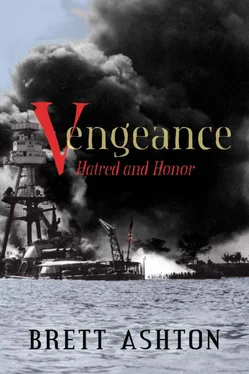Unfortunately, I was right. One of the watches on the port side suddenly pointed down and shouted, “ Torpedo, port side, forward! ”
I looked down and barely saw it through the rough water. The North Carolina was hard into her turn so the armor belt, which was supposed to protect us from this sort of thing, was pretty far up out of the water. The torpedo was very close, and it was far too late to do anything about it.
“ Cover! Everybody down! ” I shouted, as I remembered the splinters from the shattered hull of the Oklahoma shooting off around me in the attack at Pearl Harbor and the stitches they had put in my side.
Boom !
The whole ship shook violently, but those of us in Sky Control were thrown around worse than most. I was slammed up against the rail to my left and very badly bruised my shoulder and elbow. The impact was so strong that I was sure anybody standing up would have been thrown right out of our perch high above the ship and fallen to their death on the decks below. Fortunately, everybody was well braced, so it didn’t happen, but there were plenty of bruises to go around, as well as a crewman with a broken wrist.
“Jesus Christ!” one of the crewmen exclaimed.
The smell of fuel oil and explosives once again filled the air. And a few seconds later, the plume of water that had sprayed up above the Showboat began to shower down over the ship, coating the decks with oily saltwater.
“Stay alert, men; there may be more of them,” I said as I got back up, holding my shoulder and wondering, a little bit, if it might have been broken. The men instantly responded to my order and once again began to scan the water around us.
The ship came out of its turn and immediately went into a five degree port list. Palpable fear began to grow in me, almost to the point that all I could see in my mind’s eye was the overturned hull of the Oklahoma as its Sky Control tower came crashing down in the water next to me, except this time, I was in that tower.
What if North Carolina capsized? How would the crew get out of the tower in time to get away from the ship? It was a long way down from here to the water, and the thought of jumping was inconceivable. It struck me then that I had never thought of how I would get off of the ship from the top of the tower if we had to quickly abandon. I was always worried about how the men in the engine rooms would get out of the ship if they had to, so the thought of getting down from Sky Control had never crossed my mind before.
My attention was suddenly brought back to the situation at hand when the “man overboard” alarm sounded. One of the crew had been washed overboard during the wave caused by the explosion. It’s hard to believe how much water a blast like that can throw up into the air. Some parts of the deck reported having as much as two feet of water suddenly rush across it.
In less than ten minutes, the listing of the ship began to level out, and my worst fears at the time were not realized. The Showboat would apparently live to fight another day, but five more of her crew had fought their last battle, one being washed over the side and never recovered; the other four either killed instantly when the torpedo detonated or trapped in the flooding in the forward part of the hull. The unsettling part of it being, for the one trapped by flooding, several of the crew reported hearing tapping coming from the forward part of the ship for almost a day. Weeks later, when his body was recovered, it was revealed he had drowned, trapped alone and alive in a flooded compartment for quite some time, where no one could reach him.
Over the next few hours, the crew kept their eyes sharply focused on the water around us as we stayed in formation with the Hornet . It’s a testament to the dedication of the crew of the North Carolina that we were able to stay in formation after being damaged to the degree that we were.
The Wasp was not so lucky. She continued to burn out of control for several hours, with frequent explosions from her own ordnance making a bad situation even worse. A little bit after 1500, she was ordered abandoned with almost two hundred of her crew killed and almost four hundred wounded.
Later on that evening, the admiral of the task force ordered the Wasp to be scuttled and several torpedoes from one of the destroyers in the task force finished her off.
The attacking submarines apparently went deep and got away unscathed.
The war in the Pacific became just that much more difficult with the loss of another carrier. At that point, and for some period following, the Hornet was the only active carrier in the Pacific Ocean capable of facing the many carriers of the Imperial Japanese Navy.
To make matters worse, the Showboat had to return to Pearl Harbor for repairs to her hull from the torpedo damage we had sustained in the attack, leaving only one battleship in the Pacific, the South Dakota , to cover the whole ocean.
With one carrier and one battleship versus the Empire of Japan, the chances of winning the war never looked so slim.
To me, it was all the more reason to kill more Japs as quickly as possible. And, with our trip to Pearl Harbor, I would finally get my forty-millimeter anti-aircraft guns to do it with.
The next couple of years went by with the North Carolina being fairly involved in the business of prosecuting the war. We were everywhere doing everything from the Solomons Campaign through the Gilbert Islands, Nauru, the Marshall Islands, Kwajalein Atoll, the Marianas Campaign, Saipan, and the Battle of the Philippine Sea. There were many hours of dull boredom followed by brief moments of intense activity, which is how wars usually go.
The real joy for me was in knowing that everywhere we went, we left plenty of dead Japs in our wake. I never got tired of shooting them down out of the sky or watching the shells from the ship’s mighty sixteen-inch guns in combination with my twenty five-inch guns come crashing down on an enemy stronghold on some God-forsaken Pacific island.
In July of ’44, the Showboat received good news. She was going stateside to Bremerton, Washington for a badly needed overhaul and upgrade of the weapons systems.
“This is great!” I thought. The crew would be allowed to take some badly needed leave and would have the chance to get caught up with their families. I could get Susan to bring the kids out to Washington when it came my turn to take leave. It would be the first chance to see them since January of ’42, when we said goodbye as they left Hawaii.
Or I thought it was good when I first heard the news.
Several days later, I was passing the time, as I usually did, in Sky Control, keeping an eye on things, studying the ship’s engine systems, and writing a letter to Susan to tell her the news when one of the XO’s marine orderlies stepped through the hatch.
“Commander Williams,” he said, greeting me.
“Yes, Corporal,” I replied.
“The XO would like to see you in his office right away, sir.”
“Understood. Tell him I’m on my way,” I said as I began to stow my letter and study materials.
“Very well, sir.” He turned and stepped back through the hatch.
“Right away?” I thought to myself. It’s not often when Commander Stryker wants to see somebody “right away,” and usually, it’s not for the kind of reason you would end up liking. My instincts began a revolt, which was soon validated in actuality.
Arriving at his office, I was greeted by the same corporal I had just spoken to in Sky. He opened the door, letting me in, saying only “The XO is waiting for you, sir.”
Читать дальше












